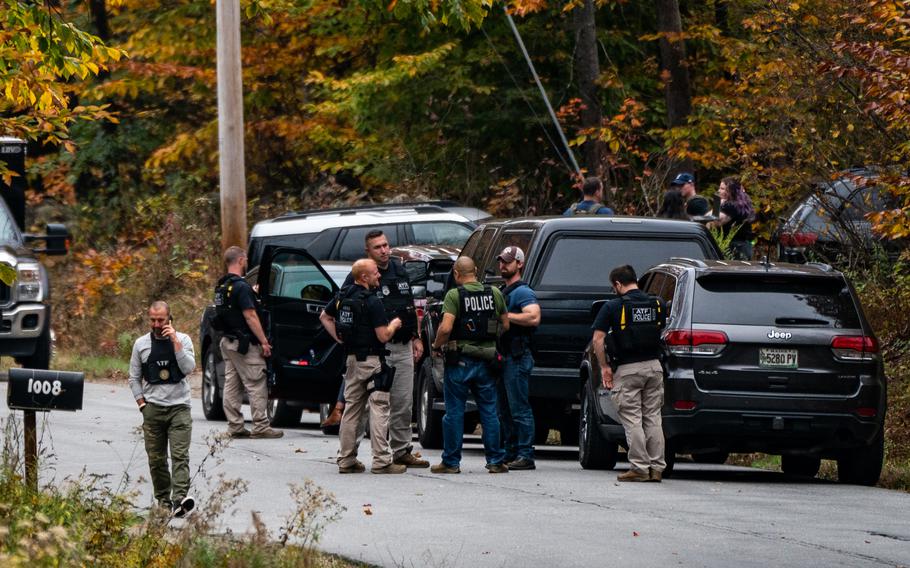U.S.
Suspected Maine gunman was hospitalized after alarming statements, official says
The Washington Post October 27, 2023

Law enforcement personnel in Bowdoin, Maine, on Thursday. (Salwan Georges/The Washington Post)
The man police suspect killed 18 people in shootings in Lewiston, Maine, on Wednesday night had so alarmed people around him that he was hospitalized and received mental health treatment this summer, according to a person familiar with the investigation.
Police say 40-year-old Robert R. Card of Bowdoin, Maine, is wanted in connection with the Lewiston mass killings, which officials said took place Wednesday night just minutes apart at a bowling alley and a restaurant in the small city about 35 miles north of Portland.
These killings, the deadliest American shooting rampage in more than a year, set off a sprawling manhunt that stretched overnight Wednesday and continued throughout Thursday, with the attacker still at large as night set in.
Col. William G. Ross, who leads the Maine State Police, said that the investigation into the shootings brought officials to a vehicle parked at a boat landing area in Lisbon, Maine. The vehicle’s registration pointed to Card, Ross said, and an arrest warrant was issued for him.
Investigators delving into Card’s background quickly found evidence suggesting that his life had begun spiraling out of control over the summer, according to the person familiar with the case so far. This person, like others interviewed, spoke on the condition of anonymity to describe an ongoing investigation.
Card has been in the Army Reserve for more than half his life. He enlisted in December 2002 and has not served in any combat deployments, but instead was a petroleum supply specialist, according to his service record, which the Army released following the shooting.
During the summer, his military reserve commanders became so concerned by statements he made targeting his own unit that he was sent to a hospital, according to the person familiar with the investigation. Card received about two weeks of inpatient psychiatric treatment, the person said. It is not clear if any other consequences followed.
The episode that saw Card hospitalized occurred while he was at Camp Smith, N.Y., a New York Army National Guard installation that is used for training, according to two people familiar with the matter.
Investigators have also been told by people who knew Card that in recent months he described hearing disturbing voices, and had increasingly become fixated on the bowling alley and the restaurant where he allegedly opened fire, according to two people familiar with the investigation.
Maine does not have a “red-flag law” that would allow law-enforcement officials or relatives to try to have weapons taken away from individuals who are viewed as posing a danger to themselves or others. Speaking on Thursday, while the manhunt was still gripping the region, police emphasized that they viewed Card as dangerous but declined to say much more about him. Ross emphasized only that the suspected attacker “should not be approached” by the public.
Ross told reporters that an arrest warrant had been issued for Card for eight counts of murder. While 18 people were killed, Ross said, only eight of the victims had been identified as of Thursday morning, so the warrant only included those counts. The arrest warrant was sealed, according to the Maine State Police. Card had been an engineering technology student at the University of Maine from 2001 until 2004, but did not graduate, according to the school. He was a familiar sight around Bowdoin, according to Liam Kent, who grew up in the area, not far from Card’s family.
“I’ve seen him smoking cigarettes with, with the guys out front after they went hunting in November with all their hunting gear on,” Kent, 24, said in an interview.
Kent said Card came from “one of the biggest families in Bowdoin,” which he described as a small town. But, he added, he did not have any close ties to Card’s family, suggesting they were not his style. The family, Kent said, could be heard “shooting guns all the time,” a sound that would “reverberate up the valley.”
Attempts to speak with the suspected shooter’s family were unsuccessful Thursday. A reporter went to an address associated with his parents, but the person who answered the door declined to answer questions or make a statement. People in the home had called police about other journalists who also attempted to visit. The shooting ignited a furious search that reverberated beyond the shattered community of Lewiston, whose residents waited anxiously Thursday while the manhunt continued.
Law enforcement personnel flocked to Maine from a constellation of nearby states, including New Hampshire, Vermont, Rhode Island, Massachusetts and New York, along with federal officials from the FBI and the Bureau of Alcohol, Tobacco, Firearms and Explosives, among others.
Investigators scrutinizing the Maine attacks suspect that the shooter used a .308 rifle to commit the attacks, two people familiar with the matter said.
One of the people said that investigators have not yet found any indication that the purchase of the weapon was illegal. Both people familiar with the matter noted that the investigation is still in its early stages and that their understanding of events could change.
Robert Klemko in Bowdoin, Maine, Kelsey Ables in Seoul, Lori Rozsa in West Palm Beach, Fla., Joseph Menn in San Francisco, and Alice Crites, Alex Horton and Danielle Paquette in Washington contributed to this report.